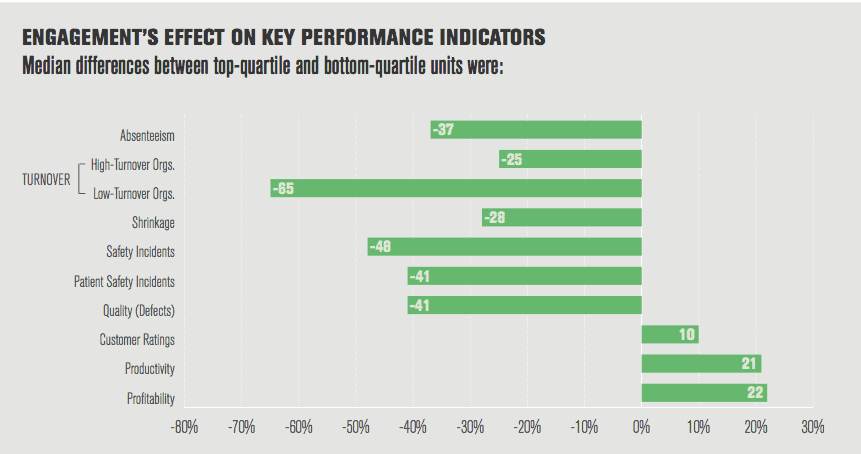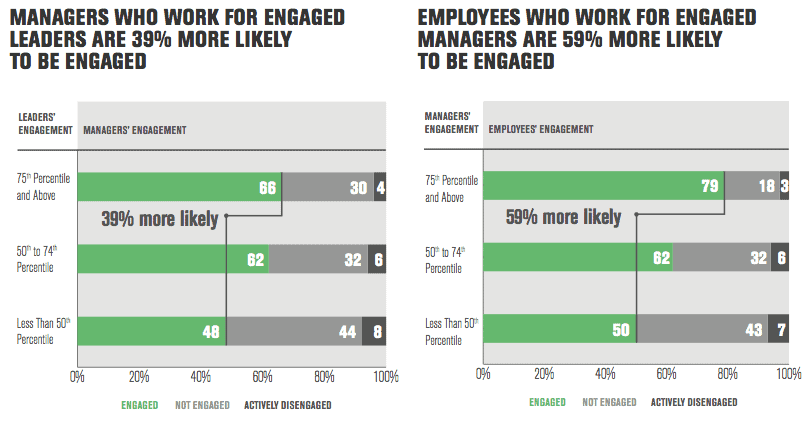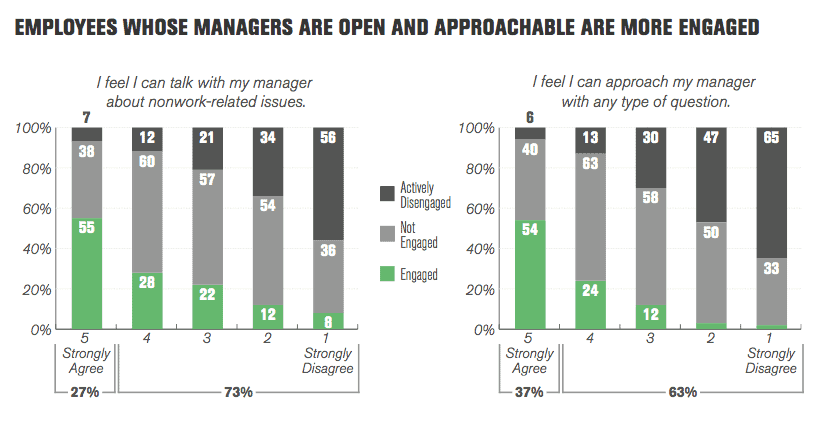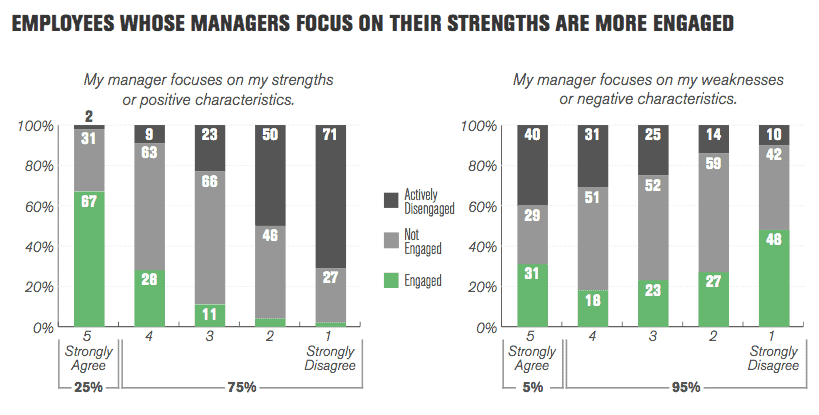Every year, the Gallup Employee Engagement survey reveals insightful findings at a scale few can achieve. It helps inform leaders, managers, and HR departments what's going on at a meta level across America when it comes to employee trends in engagement, motivation, and interests. This year's report focused in particular on managers and is a must read for anyone looking to keep their teams motivated and engaged.
There's a lot in the 56-page "State of the American Manager" report and below we break down the biggest takeaways every manager must know:
- Key stats from "The State of the American Manager"
- How you can improve your company's employee engagement
- The whole is greater than the sum of the parts

What managers must know from Gallup's Employee Engagement study, "The State of the American Manager"
As a manager, you do the best you can to lead your team. Often you're teaching yourself as you go and adding skills by trial and error. You hope the things you do make things better, but you don't always know and it's hard to track the second-order effects.
Luckily, Gallup has access to responses of millions of employees in the US and beyond who have taken their surveys. This gives them a perspective and data set that provides insights into the cause and effect of many of those ideas we all experiment with our trivial sample size of just a few team members.
Key stats from "The State of the American Manager"
1) Gallup employee engagement stats show neither employees nor managers are engaged.
- Only 30% of employees are engaged at work.
- Only 35% of managers are engaged at work.
Put 10 people in a room and chances are 7 of them aren't happy to go to work in the morning. I'm depressed just thinking about that...
2) ...and managers are to blame for the low engagement.
- The manager accounts for at least 70% of the variance in employee engagement.
- 50% of Americans have left a job to "get away from their manager at some point in their career."
The old adage holds true: People don't leave companies, they leave managers.
This shouldn't be surprising, though.
As a manager, you decide what someone works on, have the power to fix problems they're dealing with (or ignore them), decide how (or if) their career progresses, and are their main point of contact with company leadership. Being a manager impacts every aspect of their team members's work lives.
3) Gallup employee engagement ties to real measures of success for your team.
This chart shows how being engaged touches every aspect of being an employee:
I don't know any manager that wouldn't want people to come to work more often, reduce turnover, have fewer things stolen from the business, improve quality, and reduce safety issues...all while seeing a boost in customer satisfaction, productivity, and profit. Sounds great, right?
This is all fine and shows that there's both a problem, and plenty of good reason to do something about it, but what's more important is how you can actually improve employee engagement.
How you can improve your company's employee engagement
1) Start at the top of your organization and work your way down.
One of the most fascinating discoveries Gallup shared was the Cascade Effect, which they define as, "employees' engagement is directly influenced by their managers' engagement — whose engagement is directly influenced by their managers' engagement."
On the surface, this may feel like an obvious realization. Of course the attitude and engagement of a leader affects those under them. But think hard about it at your own company. Think about Larry in engineering who is a tyrant to his team or Susan who looks like she never wants to be there. Are you really surprised their teams have high turnover and low morale? Probably not, but do you do anything about it?
Great company culture comes from setting a good example, and it starts with you. You can immediately start improving engagement on your team by being engaged yourself. Remember, a manager contributes to 70% of a person's variance in their engagement.
If you have an engagement problem at your company, take a hard look at what leadership and managers are doing, and ask yourself how you all could be better leaders.
2) Take the time to build rapport with your direct reports.
How well do you know your team? Do you know what motivates them? Do you keep them at arm's length or do you know what's most important to them personally?
It turns out, being an empathetic manager that is willing to get to know their people beyond work have more engaged teams; as important, if you really don't build that rapport and connection, there's almost a zero chance anyone on your team is engaged:
Gallup reminds us in their report something that's easy to forget:
"...employees are people first, and they have an intrinsic need for bonding that does not automatically turn itself off between the hours of 8:00 a.m. and 5:00 p.m.
The best managers can understand and relate to their team members' inherently human motivations."
This is where the power of one on ones come in. A private meeting between you and your team member is the perfect time to build rapport and talk through issues and feedback no matter if they're related to work or not.
3) Tap the strengths of your people in their daily work.
Do your team members have the chance to do their best work each day? Do you leverage everyone's strengths or randomly assign work? Do you know what the strengths are for each person on your team?
If you answered "no" to any of those questions then consider these stats from Gallup:
"Employees who use their strengths every day are six times more likely to be engaged at work."
"When managers focus on employees' strengths, 61% of workers are engaged and only 1% are actively disengaged"
"When employees use their strengths, they are more engaged, perform better and are less likely to leave their company."
And when measured against Gallup's standard engagement scores, focusing on strengths again stands out:
What's most fascinating is how weaknesses don't matter. In fact, not focusing on them at all seems to have higher engagement than anything else. Meanwhile, just as stark is just how much strengths stand out as a driver of engagement; those that get to focus on their strengths are massively engaged, while those that never get to work on them are clearly disengaging en masse.
And Gallup is not alone. Ben Horowitz encourages managers to "hire for strength, not lack of weakness" and Deloitte recently reported on their own findings on strengths:
"...almost all the variation between high- and lower-performing teams was explained by a very small group of items. The most powerful one proved to be "At work, I have the opportunity to do what I do best every day.”
Business units whose employees chose "strongly agree” for this item were 44% more likely to earn high customer satisfaction scores, 50% more likely to have low employee turnover, and 38% more likely to be productive."
With all this evidence, consider taking a break to reflect on your team's strengths. Try to find ways to leverage them more often and give each team member more of a chance to use their strengths every day and further develop them.
The whole is greater than the sum of the parts.
While following any one of the pieces of advice from our summary or the many things in the Gallup report will improve your team, it turns out that the sum of all the recommendations when combined is even greater:
Gallup calls this the "Additive effect" because, "using them together leads to gains that more than double the effect of using any single strategy on its own." So while it is a ton of work to invest in all of these things that lead to success, your payoff will be even greater as they act as force multipliers on one another.
Leaders, it's on you to invest in & develop your managers.
With all the evidence pointing to disengaged managers not doing enough to create engaged teams of their own, it's easy to put all the blame on them. But the worst indictment in the whole report to me is this:
"The majority of managers do not believe their developmental needs are being met. Only four in 10 managers "strongly agree” with the statement, "This last year, I have had opportunities at work to learn and grow.” And just one in three managers strongly agree with the statement, "There is someone at work who encourages my development.”
If you do not support and develop the managers in your organization, none of the things that lead to healthy engagement in your workforce are likely to happen. You have to provide the training, mentoring, and support, while also creating systems that reward the right actions by managers.
A real, lasting competitive advantage.
Invest in your people and you may be surprised by the results. This Gallup report shows there's much to be gained by improving your managers and the overall engagement in your organization. It also shows what a competitive advantage it can be.
If only 30% of employees and 35% of managers are engaged, then any progress by your company in these areas will make you stand out against the competition in both your market and the jobs market.
Are you ready to invest in your people?









